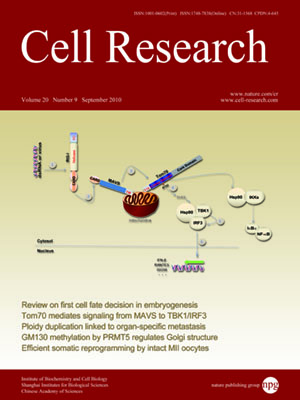
Volume 20, No 9, Sep 2010
ISSN: 1001-0602
EISSN: 1748-7838 2018
impact factor 17.848*
(Clarivate Analytics, 2019)
Volume 20 Issue 9, September 2010: 1012-1022
ORIGINAL ARTICLES
Organ-specific enhancement of metastasis by spontaneous ploidy duplication and cell size enlargement
Xin Lu1, Xuemin Lu1 and Yibin Kang1,2
1Department of Molecular Biology, Princeton University, Princeton, Washington Road, LTL 255, NJ 08544, USA
2Breast Cancer Program, The Cancer Institute of New Jersey, New Brunswick, NJ 08903, USA
Correspondence: Yibin Kang,(ykang@princeton.edu)
Aneuploidy is commonly observed in breast cancer and is associated with poor prognosis. One frequent type of aneuploidy, hypertetraploidy, may derive from ploidy duplication of hyperdiploid cells. However, the pathological consequences of ploidy duplication in breast cancer progression have not been characterized. Here, we present an experimental system demonstrating spontaneous appearance of hypertetraploid cells from organ-specific metastatic variants of the MDA-MB-231 breast cancer cell line through ploidy duplication in vitro and in vivo. The hypertetraploid progenies showed increased metastatic potential to lung and brain, but not to bone, which may be partially explained by the distinct capillary structures in these organs that confer differential lodging advantages to tumor cells with enlarged size. Our results suggest a potential mechanistic link between ploidy duplication and enhancement of metastatic potentials, as was observed in previous clinical studies of breast cancer.
Aneuploidy is commonly observed in breast cancer and is associated with poor prognosis. One frequent type of aneuploidy, hypertetraploidy, may derive from ploidy duplication of hyperdiploid cells. However, the pathological consequences of ploidy duplicati
FULL TEXT | PDF
Browse 2335


